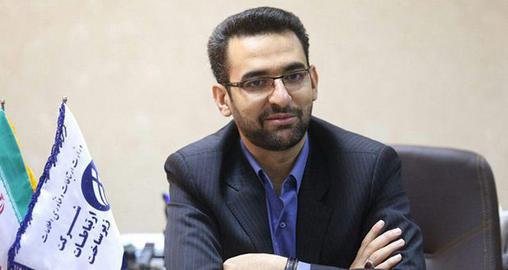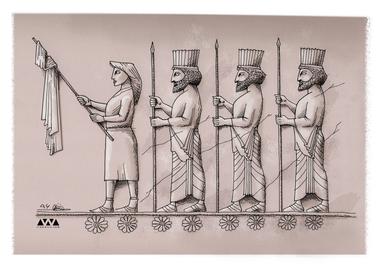More than a month after nationwide protests in Iran, officials in the Islamic Republic are still worried about the role Telegram played in spreading unrest to dozens of Iranian cities. Several figures from Iran’s Supreme Council of Cyberspace have suggested that replacing the messaging app is the best course of action for preventing a similar situation arising in the future.
In the absence of other major social networks — Twitter, Facebook and other sites were blocked more than eight years ago, during the mass protests that followed the disputed 2009 presidential election — Telegram has become the main communication network in Iran. During the recent protests, Islamic Republic officials repeatedly expressed their discontent with the app, many of them blaming it for the unrest.
More than a year ago, Telegram’s CEO Pavel Durov announced that the app has 40 million active users in Iran. And, according to a recent survey conducted by Iranian Students Polling Agency (ISPA) for the Iranian President’s Center for Strategic Studies, around 60 percent of Iranians use Telegram [Persian link].
A few days after the protests started in December 2017, Islamic Republic authorities blocked access to Telegram. At the time Pavel Durov reported that Iranian officials had asked Telegram to block channels that covered or encouraged the protests. At first Telegram blocked the Amad News channel because not only had it encouraged the protesters to use Molotov cocktails but it had also shared a video of a man threatening government officials and agents with armed action. Durov tweeted: “Calls for violence are prohibited by the Telegram rules. If confirmed, we'll have to block such a channel, regardless of its size and political affiliation.”
Telegram’s decision drew criticism from Iranians and others, including free internet advocates, as the Washington Post reported. When Telegram eventually rejected the request for blocking specific channels, Iran blocked the whole nation’s access to the social network.
Not Enough or “Desirable”
Less than two weeks later, authorities removed the block on Telegram and Iranians were allowed to access the network. However, Iranian officials continue to be obsessed with Telegram and what it can be used for. The Minister of Information and Communications Technology Mohammad-Javad Azari Jahromi reported that, over the period when Telegram and Instagram were blocked, the use of internet bandwidth in Iran fell by half. He added that the government was still in negotiations with Telegram. “If people are to continue using Telegram and Telegram wants to become connected to our infrastructure, then it must respect our rules,” he said. So far, he said, the current measures taken by Telegram’s management were neither enough nor “desirable.”
Prior to this, Brigadier General Gholamreza Jalali, the head of Iran’s Civil Defense Organization known for his hardline stance toward the Green Movement and its leaders Mir Hossein Mousavi and Mehdi Karroubi, said: “Considering the role played by Telegram in recent riots, we must seriously change our behavior.” He claimed that during the period that Telegram was blocked, domestic messaging apps found a new life, with the number of subscribers reachingg 10 million. Iranian messaging apps “must be supported,” he said.
Five Alternatives
Reza Taghipour, a member of the Supreme Council of Cyberspace and a former minister under Mahmoud Ahmadinejad, listed five alternatives to Telegram: Wispi, Soroush Messenger, Gap Messenger, iGap Messenger and BisPhone Plus. Taghipour was the Minister of Communications from 2009 to 2012, and under him, the ministry played a major role in surveilling protesters and identifying their contacts.
A few days after Taghipour’s comments, Abolhasan Firoozabadi, Secretary of the Supreme Council of Cyberspace, reported that the council had approved support for the five domestic messenger apps. The council will approve unsecured loans for up to 5 billion tomans, or over $135,000, for the domestic apps. Firoozabadi said the companies would only have to provide promissory notes for the deal. In other words, they would receive grants, not loans that they have to pay back.
Firoozabadi, who is a champion of tougher and more extensive internet restrictions, also said that, in an effort to support these domestic companies, they would be given discounts on the cost of bandwidth. Users would pay one-third of the usual rate for using these apps.
Although Firoozabadi and other officials refer to the apps as “domestic”, it is difficult to identify whether all five of the apps Reza Taghipour highlighted are based or operating from Iran. Some of them, including Gap and Wispi, are registered in other countries, though this could be part of measures to avoid both scrutiny and sanctions. Although Taghipour had listed the apps, Firoozabadi stopped short of doing so. “People know their names,” he said.
On January 12, the US government added the Supreme Council of Cyberspace to its sanctions list “for engaging in censorship or other activities with respect to Iran that prohibit, limit, or penalize the exercise of freedom of expression or assembly by citizens of Iran, or that limit access to print or broadcast media...the [council] oversees the Iranian regime's disruption of the free flow of information by restricting access to tens of thousands of websites, particularly those of international news sources, anti-regime outlets, ethnic and religious minorities, human rights groups, and popular social media sites.”
Advertising Helps Maintain Independence
Senior Islamic Republic officials have said that Wispi is a domestic app and receives financial support from the Iranian government. But Wispi has also launched a vast advertising campaign from outside Iran, targeting Iranians inside the country. Radio Javan, a Persian-language online audio and video streaming service based in the US, broadcasts many Wispi ads, and Wispi sponsors hours of Radio Javan’s programming.
Sina Valiollah is one of the main producers and hosts of Radio Javan. He and an Iranian rapper named Sogand often feature in programs sponsored by Wispi. Following the announcement that the Islamic Republic officially supports the app and promotes it as an alternative to Telegram, a number of Iranians went on to Twitter to question Valiollah about this.
In answer to them, Valiollah tweeted that, for him and for Radio Javan, the important thing was the income from the advertisements. “I understand your concerns,” he wrote, “but you must remember that TV networks must either be political to have a government budget or must get their income through ads to remain private and non-political.” He pointed out that other online broadcasters have gone out of business because they could not support themselves through ads. If Javan rejected advertisers, it could happen to it too.
But a Center for Human Rights in Iran (CHRI) report [Persian link] expresses concern that communication through Wispi might not be secure because it uses servers that belong to Shatel, the largest internet service provider in Iran. The news has led to speculation that Shatel is one of Wispi’s co-owners, although Shatel has denied this, without explaining why there are Wispi portals on its servers.
Radio Javan’s Sina Valiollah has shrugged off the concern. This app “is not a vital necessity, and nobody is forced to use it,” he wrote. He went on to say that responsibility for a company's activities could not rest with the person presenting an advertisement for the company. Take the announcer of commercials for Iran’s Bank Melli, he said. Surely he could not be held accountable for the bank’s huge embezzlements?
It any case, it would appear that the Islamic Republic is doing its best to find a replacement for Telegram. It wants to entice more than 40 million Telegram users to migrate to one of Iran’s “domestic” apps. But many experts have said that the effort is bound to fail unless Telegram and Instagram are blocked permanently, leaving Iranian users no other choice.
But considering the track record of Iranian security agencies, using apps that the Islamic Republic promotes might be unsafe, and might put users at risk. And whether or not Telegram is secure is altogether another matter.
visit the accountability section
In this section of Iran Wire, you can contact the officials and launch your campaign for various problems

























comments